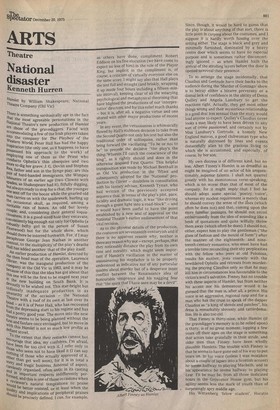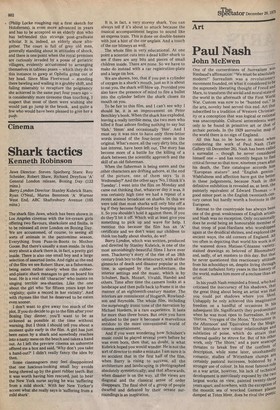ARTS
Theatre
National disaster
Renneth Hurren
Hamlet by William Shakespeare; National Theatre Company (Old Vic)
There is something sardonically apt in the fact that the most agreeable personations in the National Theatre's new production of Hamlet are those of the gravediggers. Faced with accommodating a few of the Irish players taken into the company few The Playboy of the Western World, Peter Hall has had the happy inspiration (the only one, as it happens, to have Possessed his approach to the work) of employing one of them as the Priest who conducts Ophelia's thin obsequies and two rilore to dig her grave. J. G. Devlin and Stephen Rea, father and son in the Synge play, are this labourers of hard-handed immigrants, the Wimpey of an earlier age (two Clowns with !Pades, as Shakespeare had it), fitfully digging, but always ready to stop for a chat, the younger c'ne sent off for the booze while the gnarled old tri„_an carries on with the spadework, hurling up the occasional skull, as required, among a veritable rain of bones. An odd but lovely c°1-iPle; and, considering their general loquaciousness, it is a good-sized hole they excavate, conveniently big enough not only for Ophelia (a robustly hefty girl in the person of Susan ieetwood) but for the whole show, which Shod there be interred forthwith. For, if I may Paraphrase George Jean Nathan in another eT,ontext, to the multiplicity of the play's deaths Hall has added another: that of the play itself. .„ An earlier production of Hamlet, directed by the then head man of the operation, Laurence Olivier, was the inaugural production of the ' ec"PanY at the Old Vic in 1963, and it may be because of this that the idea has got about that this one will be the first to be staged next year 1_,I1 the new building on South Bank. It is °evoutly to be wished not. This star-bright but !edio „ us.Y inadequate production is as worthy of the occasion — the National hTheatre with a roof of its own at last over its c„,ead — as it is of Peter Hall, who has recovered hunm the depressing start to his regime and has th4c1 a pretty good year. The move into the new ieatre seems to be being planned without the „ 2.'s and fanfare once envisaged, but to move in With this Hamlet is not so much low profile as defiant scowl. To the extent that their remarks cannot but ncourage that idea; my confreres, I'm afraid, t'Iave been far too civil with it. I refer only to „ hose who seem not to have liked it (I can say outohthi ntsont those who actually approved of it, an er
get well soon), for it is in total a get well soon), for it is in total a
Sorry ,and tragic business, funereal of aspect, anr:17salY organised, often antic in its casting for,„". in important respects indifferently perw:.e.viewer' a el, and this is one of those occasions when
s natural temptations to praise uold be better resisted, or at least when the quality , and implications of peripheral praises
Thou
id be precisely defined. I can, for example, as others have done, compliment Robert Eddison on his fine elocution (we have come to expect no less of him) in the role of the Player King; but implicit in the compliment is, of course, a criticism of virtually everyone else on the same score. I might say also that Hall plays the text full and straight (and briskly, wrapping it up inside four hours'inclUding a fifteen-minute interval), keeping clear of all the wearying psychological and metaphysical theorising that have blighted the productions of our 'interpretative' directors, and for this relief much thanks — but it is, after all, a negative virtue and one shared with other major productions of recent years. • In any event, the virtuousness is whimsically flawed by Hall's stubborn decision to take from the Second Quarto not only his text but also the traditional order of soliloquies, rather than bring forward the vacillating "To be or not to be" to precede the decisive "the play's the thing/Wherein I'll catch the conscience of the king", as it rightly should and does in the otherwise despised First Quarto. This helpful transposition was made by Michael Benthall in an Old Vic production in the 'fifties and subsequently adopted for the 'National' production by Olivier — doubtless in consultation with his literary adviser, Kenneth Tynan, who had written of the previously accepted sequence that, in terms of the play's plot, pace, lucidity and dramatic logic, it Was "like driving through a green light into a road-block" — and it would have been useful to have the point established by a new seal of approval on the National Theatre's earlier endorsenient of that vital revision.
As to the physical details of the production, the costumes are seventeenth-centuryish and if there is no apparent reason why, neither is there any reason why not — except, perhaps, that they noticeably distance the play from its own time and morality, which might seem important if Hamlet's vacillation in the matter of assassinating his stepfather is to be properly understood as indicative not of any particular qualms about murder but of a desperate inner conflict between the Renaissance idea of honourable vengeance and his nagging fear that "the spirit that I have seen may be a devil". Since, though, it would be hard to guess that the play is about anything of that sort, there is little point in carping about the costumes, and I suppose it is hardly worth fussing over the setting either. The stage is black and grey and minimally furnished, dominated by a heavy centre door which seems to have no especial purpose and is sometimes rather disconcertingly ignored — as when Hamlet hails the arrival of the strolling layers before the door is opened to reveal their presence.
To so arrange the stage incidentally, that Claudius and Gertrude have their backs to the audience during the 'Murder of Gonzago' show is to betray either a bizarre perversity or a dismal lack of confidence in the ability of Denis Quilley and Angela Lansbury to get the reactions right. Actually, they get most other things wrong and their mysterious relationship is a good deal less sensual than the story would lead anyone to expect: Quilley's Claudius never looks a man likely to have been driven to any sort of crime passionnel, and certainly not by Miss Lansbury's Gertrude, a homely New England matron, a good clubwoman type who is naturally distressed by lines and events distastefully alien to the gracious living to which she is accustomed, and especially, of course, by her son.
My own distress is of different kind, but no less. Albert Finney's Hamlet is as dreadful as might be imagined of an actor of his unquestionably superior talents. I shall not quarrel greatly with his monotonous verse-speaking, which is no worse than that of most of the company, for it might imply that I feel he should adopt some special 'poetry voice', whereas my modest requirement is merely that he should convey the sense of the lines (which often he does not) and that, coming upon the more familiar passages, he should not recoil embarrassedly from the idea of sounding like a book of quotations and quite wilfully throw them away (which often he does). I should not, either, expect him to play the gentleman ("the glass of fashion and the mould of form") after the manner of the eighteenthand nineteenth-century romantics, who must have had a terrible time reconciling their shy perplexities with the fellow who jeers at old Polonius, insults his mother, jests coarsely with the bewildered Ophelia and retreats from murdering the praying Claudius only so that he may kill him in circumstances less favourable to the victim's soul's salvation. Finney has no trouble with these aspects of Hamlet, but from neither his accent .nor his demeanour would it be guessed that the man is, after all, a prince. His voice is an aggressive, regional rasp and for a man who has the crust to speak of the dapper Claudius as "a king of shreds and patches", his dress is remarkably slovenly and tatterdemalion. He is also too old.
That Finney is thirty-nine, while Hamlet (if the gravedigger's memory is to be relied upon) is thirty, is of no great moment; lopping a few years off their ages on the Stage is something that actors take gratefully in their stride, and older men than Finney have been wholly plausible Hamlets. The trouble with Finney is that he seems to have gone out of his way to put years on. In his voice (unless I was mistaken about a couple of lapses into a Scottish accent) he seems halfway to playing Macbeth, and in his appearance he seems halfway to playing Lear. Fit he may be, from all those dedicated hours in the Grosvenor House gym, but his agility seems less the mark of youth than of • surprisingly spry middle age.
His Wittenberg 'felow student', Horatio (Philip Locke roughing out a first sketch for Holofernes), is even more advanced in years and has to be accepted as an elderly don who has befriended this strange post-graduate scholar. It is, indeed, an elderly show altogether. The court is full of grey old men, generally standing about in attitudes of shock, and there is one point when the royal premises are curiously invaded by a posse of geriatric villagers, evidently accustomed to arranging themselves in tableau poses — which they do in this instance to gawp at Ophelia going out of her head. Since Miss Fleetwood — standing there bawling and wailing in a grubby shift, and failing miserably to recapture the poignancy she achieved in the same part four years ago — is considerably more tiresome than touching, suspect that most of them were wishing she would just go jump in the brook, and quite a few who would have been pleased to give her a push.



































 Previous page
Previous page